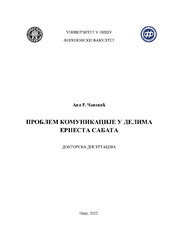Приказ основних података о дисертацији
Problem komunikacije u delima Ernesta Sabata
| dc.contributor.advisor | Milutinović, Dejan | |
| dc.contributor.other | Karanović, Vladimir | |
| dc.contributor.other | Živković, Dušan | |
| dc.creator | Čanović, Ana R. | |
| dc.date.accessioned | 2023-03-28T21:13:48Z | |
| dc.date.available | 2023-03-28T21:13:48Z | |
| dc.date.issued | 2022 | |
| dc.identifier.uri | http://eteze.ni.ac.rs/application/showtheses?thesesId=8589 | |
| dc.identifier.uri | https://fedorani.ni.ac.rs/fedora/get/o:1864/bdef:Content/download | |
| dc.identifier.uri | https://plus.cobiss.net/cobiss/sr/sr/bib/84348937 | |
| dc.identifier.uri | https://nardus.mpn.gov.rs/handle/123456789/21339 | |
| dc.description.abstract | The subject of the doctoral dissertation entitled The problem of communication in the works of Ernesto Sabato is the research into impossibility of communication between the heroes in the prose of the Argentinian writer Ernesto Sabato. The key issues that occupied Sabato in novels and essays are: the questions of good and evil, God, the meaning of existence, the possibilities of cognition and communication, loneliness, literature, as well as the problems of artistic creation. In this dissertation the above issues will be considered from the angle of lack of communication between the heroes in the novels The Tunnel (El Túnel), On Heroes and Tombs (Sobre héroes y tumbas) and The Angel of Darkness (Abaddón, el Exterminador); the research also includes Sabato’s essays: One and the Universe (Uno y el Universo), Men and Gears (Hombres y engranajes), Heterodoxy (Heterodoxia), The Writer and his Ghosts (El escritor y sus fantasmas), memoirs Before the End (Antes del fin) and The Resistance (La resistencia), as well as Dialogues with Jorge Luis Borges (Diálogos: Jorge Luis Borges - Ernesto Sábato). In addition, this paper examines the existentialist approach to the problem of communication in the context of European, American and Hispanic literature, all with the aim of determining the originality of Sabato's novels, when it comes to the concepts of (non)communication and cognition of painful reality. The aim of the dissertation is to address the following problems: the lack of communication between Sabato's heroes, the manner in which the motives of (non)communication and loneliness are presented in Sabato's prose, the manner in which the characters of Sabato's novels require a reader’s active cooperation in the process of understanding their actions, stylistic means by which Sabato achieves the impossibility of communication between the heroes in his works, as well as possible doubts and open questions after reading Sabato’s novels. The paper uses discourse analysis and conversation analysis as the main methodological approaches. The discourse is viewed from a psychological and sociological perspective, i.e. taking into account the writer's personality and psychological situations that accompanied the creation of his works, as well as the social and historical circumstances that were important for Sabato’s work. The starting point is that communication in a literary text can occur on three levels: syntactic, semantic and pragmatic; therefore, the impossibility of communication within Sabato’s novels is seen through the same levels. The research of the phenomenon of (non)communication between the heroes, both in Sabato's opus and in relevant novels in a broader context, will be viewed as a language conflict, i.e. as a narrative strategy that will contribute to expanding interpretive insights into the opus of the famous Argentian author. The research has shown that the heroes of Sabato's novels are connected by the fact that the absence of their communication stems from their belief that no one can understand them; it further implies that (non)communication is the result of loneliness of heroes living in subjective reality. Finally, the research into the phenomenon of (impossibility) of communication between the heroes in Sabato's works reveals that Sabato's understanding of the novel is based on the idea of communication between the writer and a reader – therefore, Sabato's novel is understood as an unfinished work that develops further after it actually ends. | en |
| dc.format | application/pdf | |
| dc.language | sr | |
| dc.publisher | Универзитет у Нишу, Филозофски факултет | sr |
| dc.rights | openAccess | en |
| dc.source | Универзитет у Нишу | sr |
| dc.subject | Ernesto Sabato | sr |
| dc.subject | Ernesto Sabato | en |
| dc.subject | (non)communication | en |
| dc.subject | discourse | en |
| dc.subject | narrative strategy | en |
| dc.subject | levels of communication | en |
| dc.subject | language conflict | en |
| dc.subject | (un)spoken | en |
| dc.subject | loneliness | en |
| dc.subject | (ne)komunikacija | sr |
| dc.subject | diskurs | sr |
| dc.subject | narativna strategija | sr |
| dc.subject | nivoi komunikacije | sr |
| dc.subject | jezički sukob | sr |
| dc.subject | (ne)izrečeno | sr |
| dc.subject | usamljenost | sr |
| dc.title | Problem komunikacije u delima Ernesta Sabata | sr |
| dc.type | doctoralThesis | |
| dc.identifier.fulltext | http://nardus.mpn.gov.rs/bitstream/id/150390/Canovic_Ana_R.pdf | |
| dc.identifier.fulltext | http://nardus.mpn.gov.rs/bitstream/id/150389/Doctoral_thesis_13427.pdf | |
| dc.identifier.rcub | https://hdl.handle.net/21.15107/rcub_nardus_21339 |



